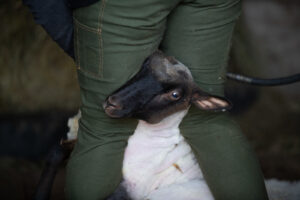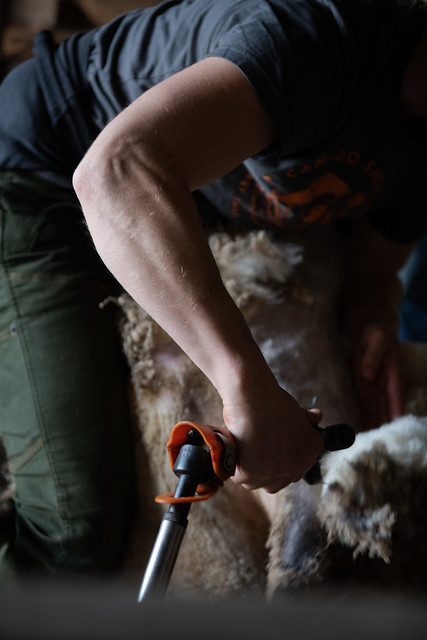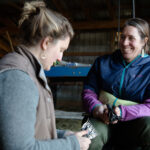A Different Kind of Success
Mary Lake’06: Shepherd, Shearer, Butcher, Farmer, Artist, Writer
By Susan Salter Reynolds
“I’m not an entrepreneur,” Mary Lake says, leaning on a fence on a resplendent Vermont fall day, looking out over her 28 acres and her flock of Icelandic sheep. The sheep look up, blinking, waiting. “And I don’t really like the word. Too much association with money, how to use it, how to spend it, how to get someone to fund your idea.” She kicks the dirt with a well-worn shoe. There’s a bit of blood on her pants—she killed and skinned a few Rex and Angora rabbits before I arrived. “But I am hustling left and right.” Big grin. “It’s less risky when you piece it together.” The sheep move quietly inside the fence. Bolt, Lake’s herding dog, checks the perimeter.
As we talk, Lake returns to the core principles that shape her commitments: relationships (with plants, animals, community); the importance of not losing money farming (“We farm to make money and the money we make pays for the farming”); constant learning (“It’s just sheep. But, oh my God, sheep have taught me basically everything”); and her deep love and respect for the work, despite the myriad hardships (“I feel like I’ve set out a bunch of different nets and I’m just constantly checking on them for fish. Which nets are catching? Which words are being impactful? Which skills are needed? What art is selling?”). Together, Lake and her husband Paul (who, by the way, met on their first day on the Saint Michael’s College campus) are working toward their goals of raising sheep that thrive; improving soils; and feeding, comforting, and caring for their community. The family barters with neighbors for hay, barn space, and grazing land in relationships they have nurtured since moving into their house seven years ago.
The soft rabbit pelts are salted and stretched out next to the sheepskins that will be tanned and sold. Lake will render the rabbit and sheep fat to make soaps and salves. She and her family—her husband and two boys (ages 6 and 8)—will eat the meat. The blood will go into compost. She will make earrings from the sheep horns. These products, since Lake posted an overnight Instagram hit, can be purchased in a whole-sheep package she calls “the whole shablamb.”
Both Lake and her husband also work off-farm. Mary shears for around 300 farms in Vermont, New York, and New Hampshire, as well as teaching shearing, and Paul works as a special educator in an intensive needs classroom. On-farm slaughtering also helps pay the bills. “There aren’t a lot of people on this path,” she explains. “It’s kinda different. And it can be scary.”
A native Vermonter, Lake grew up in South Hero. She studied journalism at Saint Michael’s, and designed a culminating project her senior year on sex workers in Senegal and Canada. After graduation she got a job at the Burlington Free Press, and began working at Pomykala, a vegetable farm in Grand Isle. Lake loved learning about the plants and doing what “my body is made to do—not sit.” She came to understand how the plants live and die and respond to stress. She learned how to read them, and she has learned how to read the sheep. “How can we be shepherd scientists,” she asks the field and the sheep. Watch how the horns grow—the ridges can reveal stress points, mineral deficiencies. Watch how the sheep move. Read the wool for nutritional information after you shear every six months (most breeds are sheared once a year, but Icelandics and some other breeds are sheared twice a year), they say. And, say the sheep, you’re welcome: Our grazing, our small hooves, and our scattered poop sequester carbon very efficiently.
Reading the world, being curious, being skeptical, asking questions—these are skills we often aren’t even aware we have. They don’t tend to go on resumes. But we hone them, Lake agrees, in college. The journalism degree helped her learn how to seek out multiple sources, assess risks (“I don’t do anything I can’t pay for”), envision the future, and consider the implications of various funding sources.
She also has had great success writing blogs, articles, and Instagram posts. “I use my degree all the time,” she says. “It helps me tell stories.” (Lake has one or two books up her sleeve.) Her ability to tell her story and do business directly with her clients led to legislation she helped pass, meaning that this Vermont farmer can have her sheep slaughtered on the farm if they are bought live. The consumer becomes the owner of the animal and assumes the risks of custom processing, and Lake avoids the bottleneck and stress of the slaughterhouse during busy harvesting months.
“I relate strongly to this work,” she says. After her time on the vegetable farm, Lake found herself wanting to learn more about animals. So she designed a three-part graduate program for herself. Part I: Fiber arts, wool science, and wool processing. Lake took classes at the Vermont shearing school at Shelburne Farms (the teachers were local professional shearers, mostly men, she says—welcoming, funny, and a little competitive). Part II: Animal husbandry, apprenticing and then managing Helen Whybrow’s Knoll Farm, in Fayston, Vermont. Part III: Meat production and processing, working at the Royal Butcher in Braintree, Vermont.
Lake loved the shearing, she explains, knees bent, legs apart, arms in a kind of Qi Gong circle-the-earth pose. It looks like she is playing the cello, which she does. “I loved the dance, the culture, and the people,” she says. And she found that people liked her in these roles, that what she was doing was useful and meaningful. “Shearing is like magic,” she says, with a look so direct it reminds a listener of the sheep. Does the listener understand? How can she help people understand the importance of this dance, the physical challenge and the emotional engagement with the animals and with fellow shearers?
Next step, scaling up. This can be a difficult pivot point for both entrepreneurs and farmers. For Lake, it means building a barn. A barn on the property would “help me do everything we’re doing now, but better,” she says. She turns and gestures to where the barn will go. Water and electricity are ready. “[Our business] could get slightly bigger, and possibly improve margins, but never enough to pay off a barn,” she explains. She says she and her husband would have to increase their non-farming labor hours, “which seems impossible because we work so much off the farm already. But we will figure something out and hopefully have a barn in the next five years.”
Lake optimistically climbs a steep learning curve every day. How much of the path she has chosen is in her genes? She was the youngest of five. Lake’s parents were not farmers, but her great-grandfather was a farmer and a shearer in England. His son, Lake’s grandfather, worked on the farm, too, until he hit and injured a motorcyclist while delivering milk. The experience led him to the church. He married and the couple moved to Jamaica to do mission work and start a family, staying for about a decade before emigrating to Canada. Lake’s parents grew up in Canada. In 2019, her father, who had served in Vietnam as a first lieutenant, first wave, and was a “really good leader,” died of cancer from exposure to Agent Orange. Lake named her shearing business after his regiment’s motto, “Can Do.”
Lake is also an activist, working to ensure that animals are killed thoughtfully, and that people understand the importance and generosity of their deaths. She looks out at her flock and it is clear she is thinking about who will be culled (due to old age, poor parasite resilience, or other health-related issues) and who will stay on to build the flock. It’s a difficult role.
On a recent trip to Washington, D.C., to speak to senators and representatives about local food initiatives, Lake teamed up with a black Muslim woman farmer from Kentucky and an indigenous fisherman from Alaska. Together, they visited about a dozen offices, telling their stories about their relationships to food and providing for their communities, and asking for support for food sovereignty and security through the programs they each run in their home state. The three formed a strong bond and continue to support one another. “This experience,” she reflects, “made me realize how the work I had done in Vermont was applicable to other states and that there are farmers who share my views on meat and food across the country. It’s not just a Vermont thing.”
This is one resilient woman, and perhaps that is also an entrepreneurial quality. “I am always trying to make connections, to make sure this life is worth living, even when it doesn’t make sense,” she says. “I mean, I think I’m successful. I’m really proud of what I’ve done and the life I’ve carved out for myself and my family.”



